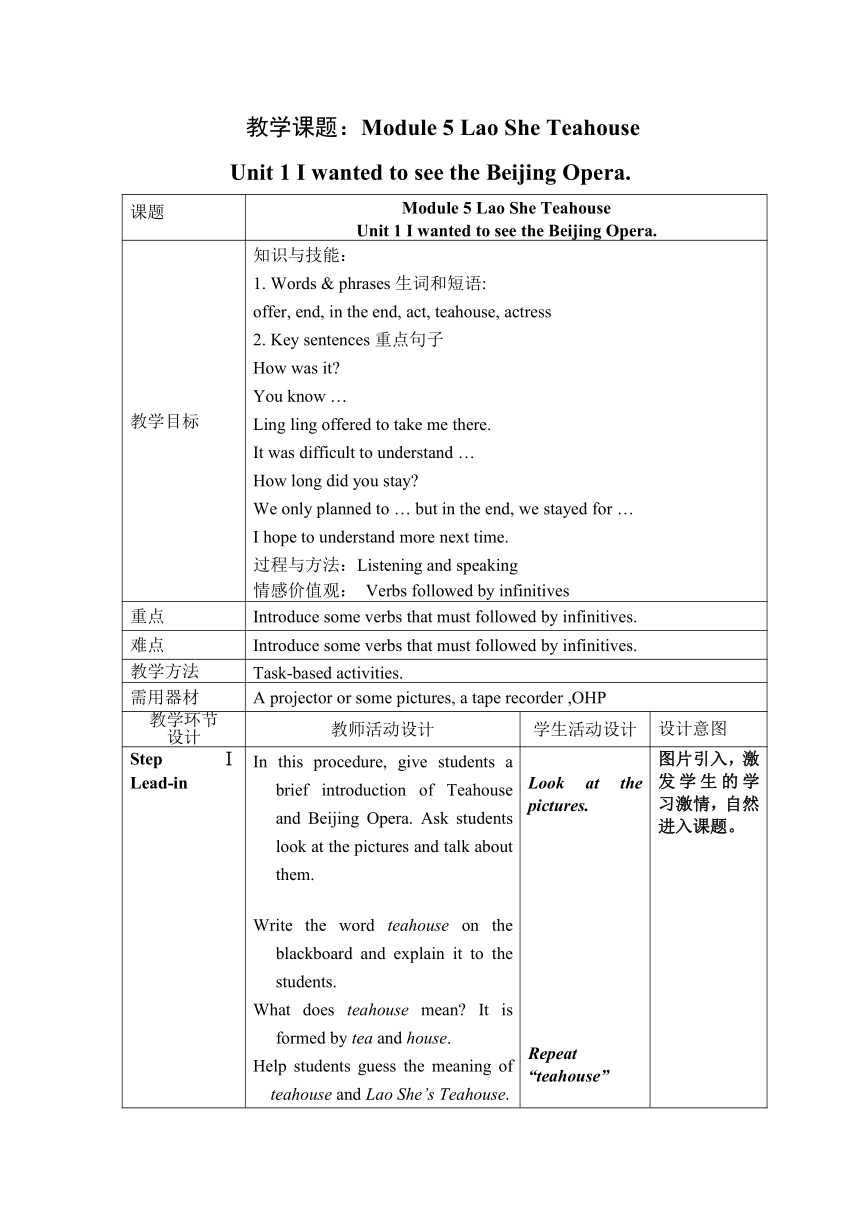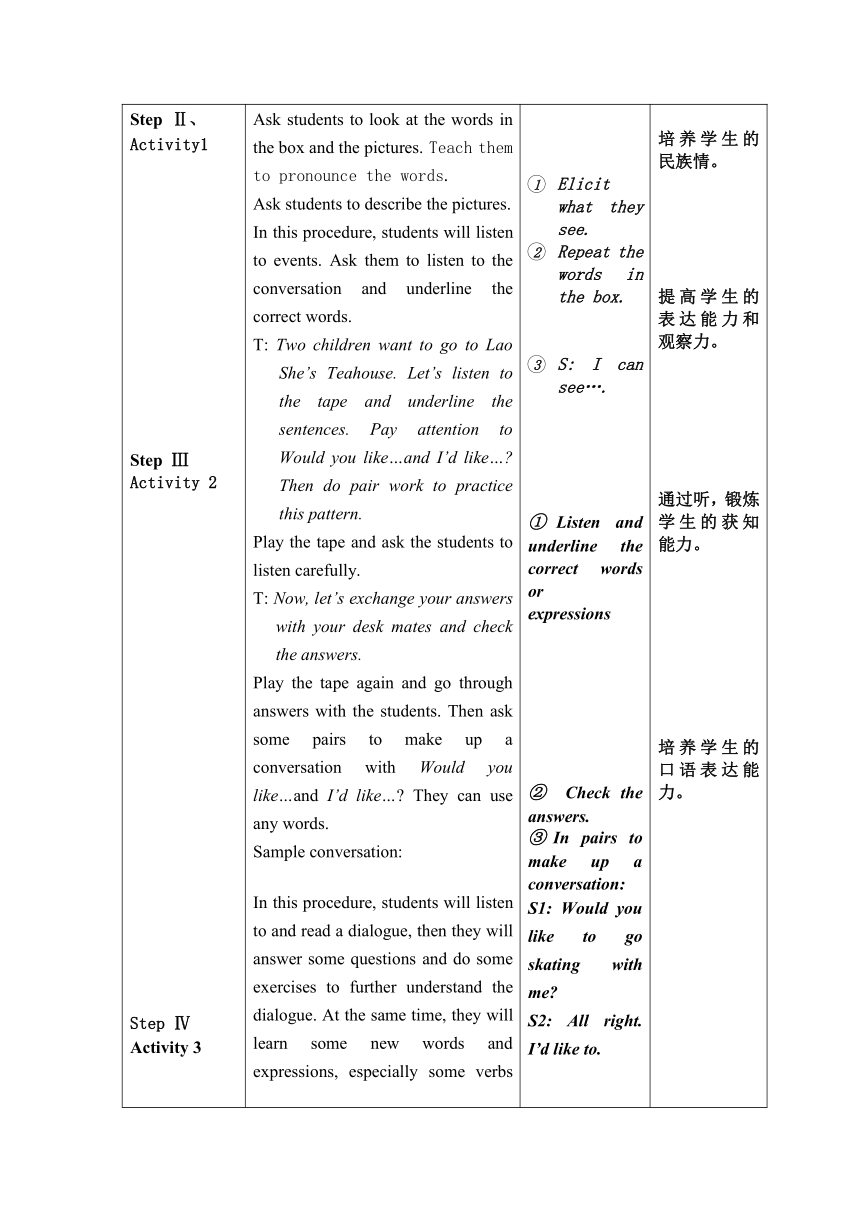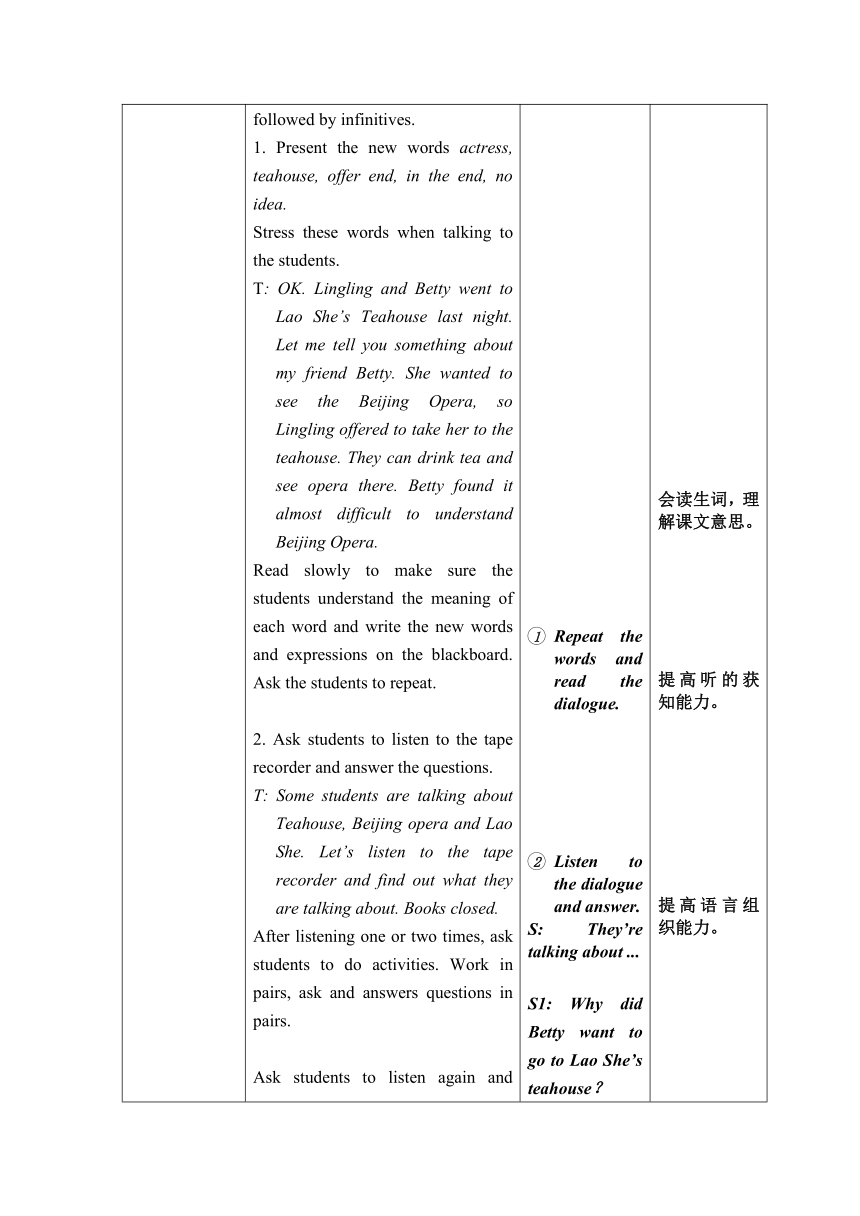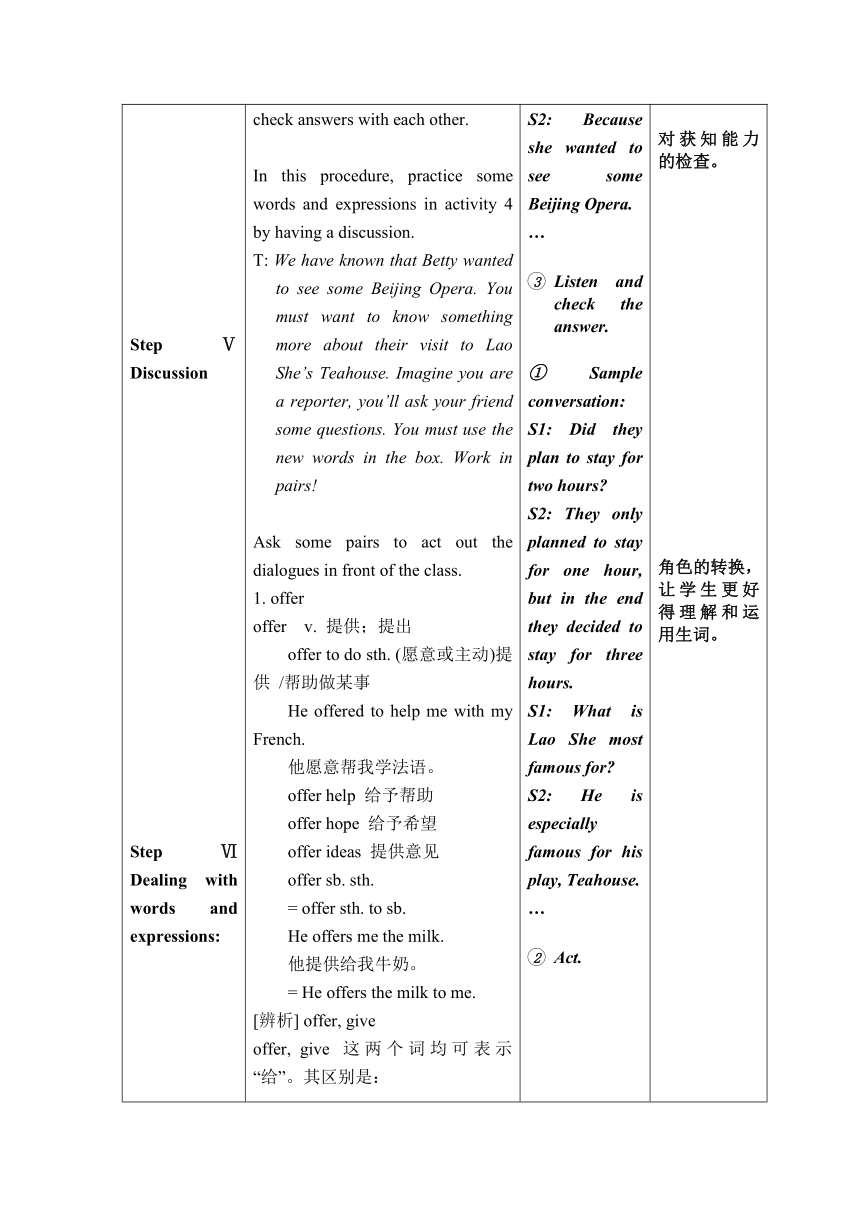外研版八年级上册教案Module 5 Unit 1 I wanted to see the Beijing Opera.
文档属性
| 名称 | 外研版八年级上册教案Module 5 Unit 1 I wanted to see the Beijing Opera. |  | |
| 格式 | zip | ||
| 文件大小 | 21.6KB | ||
| 资源类型 | 教案 | ||
| 版本资源 | 外研版 | ||
| 科目 | 英语 | ||
| 更新时间 | 2016-11-15 13:27:23 | ||
图片预览




文档简介
教学课题:Module
5
Lao
She
Teahouse
Unit
1
I
wanted
to
see
the
Beijing
Opera.
课题
Module
5
Lao
She
Teahouse
Unit
1
I
wanted
to
see
the
Beijing
Opera.
教学目标
知识与技能:1.
Words
&
phrases生词和短语:offer,
end,
in
the
end,
act,
teahouse,
actress2.
Key
sentences重点句子
How
was
it You
know
…Ling
ling
offered
to
take
me
there.It
was
difficult
to
understand
…How
long
did
you
stay We
only
planned
to
…
but
in
the
end,
we
stayed
for
…I
hope
to
understand
more
next
time.过程与方法:Listening
and
speaking情感价值观:
Verbs
followed
by
infinitives
重点
Introduce
some
verbs
that
must
followed
by
infinitives.
难点
Introduce
some
verbs
that
must
followed
by
infinitives.
教学方法
Task-based
activities.
需用器材
A
projector
or
some
pictures,
a
tape
recorder
,OHP
教学环节设计
教师活动设计
学生活动设计
设计意图
Step
Ⅰ
Lead-inStep
Ⅱ、
Activity1Step
Ⅲ
Activity
2Step
ⅣActivity
3Step
Ⅴ
DiscussionStep
Ⅵ
Dealing
with
words
and
expressions:Step
Ⅶ
A
game.Step
ⅧActivity
4Step
ⅨActivity
5
&
6Step
ⅩActivity
7
In
this
procedure,
give
students
a
brief
introduction
of
Teahouse
and
Beijing
Opera.
Ask
students
look
at
the
pictures
and
talk
about
them.Write
the
word
teahouse
on
the
blackboard
and
explain
it
to
the
students.
What
does
teahouse
mean
It
is
formed
by
tea
and
house.
Help
students
guess
the
meaning
of
teahouse
and
Lao
She’s
Teahouse.
Ask
students
to
look
at
the
words
in
the
box
and
the
pictures.
Teach
them
to
pronounce
the
words.Ask
students
to
describe
the
pictures.In
this
procedure,
students
will
listen
to
events.
Ask
them
to
listen
to
the
conversation
and
underline
the
correct
words.T:
Two
children
want
to
go
to
Lao
She’s
Teahouse.
Let’s
listen
to
the
tape
and
underline
the
sentences.
Pay
attention
to
Would
you
like…and
I’d
like…
Then
do
pair
work
to
practice
this
pattern.Play
the
tape
and
ask
the
students
to
listen
carefully.T:
Now,
let’s
exchange
your
answers
with
your
desk
mates
and
check
the
answers.
Play
the
tape
again
and
go
through
answers
with
the
students.
Then
ask
some
pairs
to
make
up
a
conversation
with
Would
you
like…and
I’d
like…
They
can
use
any
words.Sample
conversation:In
this
procedure,
students
will
listen
to
and
read
a
dialogue,
then
they
will
answer
some
questions
and
do
some
exercises
to
further
understand
the
dialogue.
At
the
same
time,
they
will
learn
some
new
words
and
expressions,
especially
some
verbs
followed
by
infinitives.1.
Present
the
new
words
actress,
teahouse,
offer
end,
in
the
end,
no
idea.Stress
these
words
when
talking
to
the
students.
T:
OK.
Lingling
and
Betty
went
to
Lao
She’s
Teahouse
last
night.
Let
me
tell
you
something
about
my
friend
Betty.
She
wanted
to
see
the
Beijing
Opera,
so
Lingling
offered
to
take
her
to
the
teahouse.
They
can
drink
tea
and
see
opera
there.
Betty
found
it
almost
difficult
to
understand
Beijing
Opera.Read
slowly
to
make
sure
the
students
understand
the
meaning
of
each
word
and
write
the
new
words
and
expressions
on
the
blackboard.
Ask
the
students
to
repeat.2.
Ask
students
to
listen
to
the
tape
recorder
and
answer
the
questions.T:
Some
students
are
talking
about
Teahouse,
Beijing
opera
and
Lao
She.
Let’s
listen
to
the
tape
recorder
and
find
out
what
they
are
talking
about.
Books
closed.After
listening
one
or
two
times,
ask
students
to
do
activities.
Work
in
pairs,
ask
and
answers
questions
in
pairs.Ask
students
to
listen
again
and
check
answers
with
each
other.In
this
procedure,
practice
some
words
and
expressions
in
activity
4
by
having
a
discussion.T:
We
have
known
that
Betty
wanted
to
see
some
Beijing
Opera.
You
must
want
to
know
something
more
about
their
visit
to
Lao
She’s
Teahouse.
Imagine
you
are
a
reporter,
you’ll
ask
your
friend
some
questions.
You
must
use
the
new
words
in
the
box.
Work
in
pairs!Ask
some
pairs
to
act
out
the
dialogues
in
front
of
the
class.
1.
offeroffer
v.
提供;提出
offer
to
do
sth.
(愿意或主动)提供
/帮助做某事
He
offered
to
help
me
with
my
French. 他愿意帮我学法语。
offer
help
给予帮助
offer
hope
给予希望
offer
ideas
提供意见
offer
sb.
sth.
=
offer
sth.
to
sb.
He
offers
me
the
milk.
他提供给我牛奶。
=
He
offers
the
milk
to
me.[辨析]
offer,
giveoffer,
give
这两个词均可表示“给”。其区别是:
give所指的“给”,
对方一般是接受;
offer所指的“给”,
对方可能接受,
也可能拒绝。试比较:
He
gave
me
some
tickets.
他给了我几张票。
He
offered
me
some
tickets,
which
I
refused
politely.
他要给我几张票,
但我婉言谢绝了。They
______
him
a
job
in
the
company,
but
he
refused(拒绝).
A.
offered
B.
took
C.
showed
D.
gaveThe
hotel
______
excellent
service
_____
all
the
visitors.
A.
offer,
/
B.
offers,
with
C.
offers,
to
D.
offers,
/2.
It’s
adj.
for
sb.
to
do
sth.
对某人而言,干某事是某样子的。E.g.:
It's
impossible
for
us
to
finish
the
work
in
one
day.
我们在一天之内完成这份工作是不可能的。
It’s
difficult
for
Betty
to
understand
the
words
of
Beijing
Opera.
3.
in
the
endin
the
end
最后;终于
They
gave
up
the
plan
in
the
end.
最终他们放弃了那项计划。
In
the
end,
things
will
mend.
[谚]车到山前必有路。
After
many
years
of
hard
work,
he
won
the
award
in
the
end.
经过许多年的努力,他最后终于获得了大奖。[链接]end
n.
结束、终止;
终点、尽头
We
walked
to
the
end
of
the
road.
我们走到了大路的尽头。
Winter
is
coming
to
an
end.
冬季快要结束了。
以end为中心词的介词短语:
at
the
end
of在……的尽头;在……的末稍
by
the
end
of到……末为止;在……结束时
before
the
end
of在……结束之前4.
No
idea.No
idea.
“不知道”,相当于I
don’t
know.
He
has
no
idea
how
to
manage
people.
他根本不知道如何做人事工作。
I
have
no
idea
(as
to)
what
you
mean.
我一点儿也不明白你的意思。
We
have
no
idea
how
the
birds
find
their
way.
我们不知道这些鸟如何找到它们的路。In
this
procedure,
do
a
game
to
help
students
find
pairs
of
sentences
which
have
the
same
meaning.
Help
them
understand
the
meaning
of
each
sentence
and
what
the
direct
speech
sentence
stands
for.Hand
some
cards
with
the
sentences
of
game
to
some
students.T:
Now
let’s
play
a
game
called
Find
Your
Friend.
A
student
will
read
one
sentence.
Those
six
students
who
got
my
cards
must
check
your
sentences.
If
your
sentence
has
the
same
meaning
with
it,
you
must
stand
up
and
read
it.
If
you
can’t
find
it,
you
may
lose
the
game.In
the
end,
help
students
find
the
rule:
each
verb
in
these
sentences
is
followed
by
infinitive.
Ask
the
students
to
remember
this
rule
and
these
verbs.
Tell
the
students
look
at
and
read
the
words
in
the
box.Ask
them
to
complete
the
passage
on
the
own.Elicit
the
answers
from
the
whole
class.Ask
students
to
read
the
conversations
individually
and
then
in
pairs.Elicit
which
words
are
usually
stressed
in
any
sentence,
for
example,
nouns,
verbs
and
adjectives
because
these
are
the
main
words
which
contain
the
important
information
in
the
sentence.
Ask
the
students
to
predict
what
the
stress
in
the
answers
is.
Remind
them
that
the
stress
is
on
the
vowel
sounds.
Elicit
student’s
idea
and
write
the
words
they
think
will
be
stressed
on
the
board.Play
the
recording
for
the
students
to
listen
for
the
pronunciation
and
stress.Play
the
recording
again.Read
the
conversations
aloud.
Remind
them
of
paying
attention
to
the
stress.Check
the
meaning
of
the
expressions
at
the
beginning
of
each
sentence
with
the
class.
Tell
them
to
finish
the
sentences
on
their
own
and
then
check
answers
in
pairs.Ask
the
students
to
read
their
sentences
in
class.
And
encourage
them
to
make
as
many
sentences
as
possible.
Look
at
the
pictures.Repeat
“teahouse”Elicit
what
they
see.Repeat
the
words
in
the
box.S:
I
can
see….①Listen
and
underline
the
correct
words
or
expressions②
Check
the
answers.③In
pairs
to
make
up
a
conversation:S1:
Would
you
like
to
go
skating
with
me S2:
All
right.
I’d
like
to.Repeat
the
words
and
read
the
dialogue.Listen
to
the
dialogue
and
answer.S:
They’re
talking
about
...S1:
Why
did
Betty
want
to
go
to
Lao
She’s
teahouse?S2:
Because
she
wanted
to
see
some
Beijing
Opera.…Listen
and
check
the
answer.①Sample
conversation:S1:
Did
they
plan
to
stay
for
two
hours S2:
They
only
planned
to
stay
for
one
hour,
but
in
the
end
they
decided
to
stay
for
three
hours.S1:
What
is
Lao
She
most
famous
for S2:
He
is
especially
famous
for
his
play,
Teahouse.…Act.Write
down
the
note
and
practice.Sample
conversation:S1:
She
offered
to
take
us
there.S2:
Would
you
like
us
to
take
you
to
Lao
She’s
Teahouse S3:
They
planned
to
stay
for
some
tea.S4:
We
are
only
going
to
stay
for
some
tea.S5:
They
decided
to
stay
longer.S6:
Let’s
stay
longer.
OK.…Read
the
wordsRead
the
passage
and
at
the
same
time
to
complete
the
passage.
Check
the
answers
in
pairs.Read
the
conversations
individually
and
in
pairs.Predict
what
the
stress
in
the
sentences.Underline
the
stressed
words,
and
check
their
answers.Read
aloud.Read
the
expressions
together.Finish
the
sentences
on
their
own
and
check
the
answers.Read
the
sentences
which
they
wrote.
图片引入,激发学生的学习激情,自然进入课题。培养学生的民族情。提高学生的表达能力和观察力。通过听,锻炼学生的获知能力。培养学生的口语表达能力。会读生词,理解课文意思。提高听的获知能力。提高语言组织能力。对获知能力的检查。角色的转换,让学生更好得理解和运用生词。培养学生的词汇的综合能力。让学生在game中掌握动词不定式作宾语。培养学生综合能力。利于学生对句子中重读音节的形成。培养学生对句子重读音节的认知。让学生预测句中重读音节的位置。加深对句子重读音节的词的掌握。练习句子的重读音节。巩固学生对动词不定式的掌握。
板书设计
I
want
to
see
the
Beijing
Opera
.Teahouse
→Lao
She
Teahouse→traditional
Beijing
OperaI’d
like
to
….
Would
you
like
to
… Offer
to
do
sth.Want
to
do
sth.Decide
to
do
sth.
练习设计
1.
She
asked
me
______
(wait)
for
her
at
the
cinema.2.
I
enjoy
________
(listen)
to
the
radio
in
the
evening.3.
It
is
not
easy
_______
(learn)
a
foreign
language.4.
He
agreed
_____
(get)
someone
to
help
us.5.
I
told
him
_________
(not
play)
in
the
street.6.
Would
you
like
______
(come)
with
me
7.
Your
task
is
______
(find)
the
cost
of
the
hotel.
8.
Should
I
___
(go)
home
now 9.
I’m
glad
_____
(see)
you
again.10.
He
needs
______
(buy)
a
new
bike.
课后反思
5
Lao
She
Teahouse
Unit
1
I
wanted
to
see
the
Beijing
Opera.
课题
Module
5
Lao
She
Teahouse
Unit
1
I
wanted
to
see
the
Beijing
Opera.
教学目标
知识与技能:1.
Words
&
phrases生词和短语:offer,
end,
in
the
end,
act,
teahouse,
actress2.
Key
sentences重点句子
How
was
it You
know
…Ling
ling
offered
to
take
me
there.It
was
difficult
to
understand
…How
long
did
you
stay We
only
planned
to
…
but
in
the
end,
we
stayed
for
…I
hope
to
understand
more
next
time.过程与方法:Listening
and
speaking情感价值观:
Verbs
followed
by
infinitives
重点
Introduce
some
verbs
that
must
followed
by
infinitives.
难点
Introduce
some
verbs
that
must
followed
by
infinitives.
教学方法
Task-based
activities.
需用器材
A
projector
or
some
pictures,
a
tape
recorder
,OHP
教学环节设计
教师活动设计
学生活动设计
设计意图
Step
Ⅰ
Lead-inStep
Ⅱ、
Activity1Step
Ⅲ
Activity
2Step
ⅣActivity
3Step
Ⅴ
DiscussionStep
Ⅵ
Dealing
with
words
and
expressions:Step
Ⅶ
A
game.Step
ⅧActivity
4Step
ⅨActivity
5
&
6Step
ⅩActivity
7
In
this
procedure,
give
students
a
brief
introduction
of
Teahouse
and
Beijing
Opera.
Ask
students
look
at
the
pictures
and
talk
about
them.Write
the
word
teahouse
on
the
blackboard
and
explain
it
to
the
students.
What
does
teahouse
mean
It
is
formed
by
tea
and
house.
Help
students
guess
the
meaning
of
teahouse
and
Lao
She’s
Teahouse.
Ask
students
to
look
at
the
words
in
the
box
and
the
pictures.
Teach
them
to
pronounce
the
words.Ask
students
to
describe
the
pictures.In
this
procedure,
students
will
listen
to
events.
Ask
them
to
listen
to
the
conversation
and
underline
the
correct
words.T:
Two
children
want
to
go
to
Lao
She’s
Teahouse.
Let’s
listen
to
the
tape
and
underline
the
sentences.
Pay
attention
to
Would
you
like…and
I’d
like…
Then
do
pair
work
to
practice
this
pattern.Play
the
tape
and
ask
the
students
to
listen
carefully.T:
Now,
let’s
exchange
your
answers
with
your
desk
mates
and
check
the
answers.
Play
the
tape
again
and
go
through
answers
with
the
students.
Then
ask
some
pairs
to
make
up
a
conversation
with
Would
you
like…and
I’d
like…
They
can
use
any
words.Sample
conversation:In
this
procedure,
students
will
listen
to
and
read
a
dialogue,
then
they
will
answer
some
questions
and
do
some
exercises
to
further
understand
the
dialogue.
At
the
same
time,
they
will
learn
some
new
words
and
expressions,
especially
some
verbs
followed
by
infinitives.1.
Present
the
new
words
actress,
teahouse,
offer
end,
in
the
end,
no
idea.Stress
these
words
when
talking
to
the
students.
T:
OK.
Lingling
and
Betty
went
to
Lao
She’s
Teahouse
last
night.
Let
me
tell
you
something
about
my
friend
Betty.
She
wanted
to
see
the
Beijing
Opera,
so
Lingling
offered
to
take
her
to
the
teahouse.
They
can
drink
tea
and
see
opera
there.
Betty
found
it
almost
difficult
to
understand
Beijing
Opera.Read
slowly
to
make
sure
the
students
understand
the
meaning
of
each
word
and
write
the
new
words
and
expressions
on
the
blackboard.
Ask
the
students
to
repeat.2.
Ask
students
to
listen
to
the
tape
recorder
and
answer
the
questions.T:
Some
students
are
talking
about
Teahouse,
Beijing
opera
and
Lao
She.
Let’s
listen
to
the
tape
recorder
and
find
out
what
they
are
talking
about.
Books
closed.After
listening
one
or
two
times,
ask
students
to
do
activities.
Work
in
pairs,
ask
and
answers
questions
in
pairs.Ask
students
to
listen
again
and
check
answers
with
each
other.In
this
procedure,
practice
some
words
and
expressions
in
activity
4
by
having
a
discussion.T:
We
have
known
that
Betty
wanted
to
see
some
Beijing
Opera.
You
must
want
to
know
something
more
about
their
visit
to
Lao
She’s
Teahouse.
Imagine
you
are
a
reporter,
you’ll
ask
your
friend
some
questions.
You
must
use
the
new
words
in
the
box.
Work
in
pairs!Ask
some
pairs
to
act
out
the
dialogues
in
front
of
the
class.
1.
offeroffer
v.
提供;提出
offer
to
do
sth.
(愿意或主动)提供
/帮助做某事
He
offered
to
help
me
with
my
French. 他愿意帮我学法语。
offer
help
给予帮助
offer
hope
给予希望
offer
ideas
提供意见
offer
sb.
sth.
=
offer
sth.
to
sb.
He
offers
me
the
milk.
他提供给我牛奶。
=
He
offers
the
milk
to
me.[辨析]
offer,
giveoffer,
give
这两个词均可表示“给”。其区别是:
give所指的“给”,
对方一般是接受;
offer所指的“给”,
对方可能接受,
也可能拒绝。试比较:
He
gave
me
some
tickets.
他给了我几张票。
He
offered
me
some
tickets,
which
I
refused
politely.
他要给我几张票,
但我婉言谢绝了。They
______
him
a
job
in
the
company,
but
he
refused(拒绝).
A.
offered
B.
took
C.
showed
D.
gaveThe
hotel
______
excellent
service
_____
all
the
visitors.
A.
offer,
/
B.
offers,
with
C.
offers,
to
D.
offers,
/2.
It’s
adj.
for
sb.
to
do
sth.
对某人而言,干某事是某样子的。E.g.:
It's
impossible
for
us
to
finish
the
work
in
one
day.
我们在一天之内完成这份工作是不可能的。
It’s
difficult
for
Betty
to
understand
the
words
of
Beijing
Opera.
3.
in
the
endin
the
end
最后;终于
They
gave
up
the
plan
in
the
end.
最终他们放弃了那项计划。
In
the
end,
things
will
mend.
[谚]车到山前必有路。
After
many
years
of
hard
work,
he
won
the
award
in
the
end.
经过许多年的努力,他最后终于获得了大奖。[链接]end
n.
结束、终止;
终点、尽头
We
walked
to
the
end
of
the
road.
我们走到了大路的尽头。
Winter
is
coming
to
an
end.
冬季快要结束了。
以end为中心词的介词短语:
at
the
end
of在……的尽头;在……的末稍
by
the
end
of到……末为止;在……结束时
before
the
end
of在……结束之前4.
No
idea.No
idea.
“不知道”,相当于I
don’t
know.
He
has
no
idea
how
to
manage
people.
他根本不知道如何做人事工作。
I
have
no
idea
(as
to)
what
you
mean.
我一点儿也不明白你的意思。
We
have
no
idea
how
the
birds
find
their
way.
我们不知道这些鸟如何找到它们的路。In
this
procedure,
do
a
game
to
help
students
find
pairs
of
sentences
which
have
the
same
meaning.
Help
them
understand
the
meaning
of
each
sentence
and
what
the
direct
speech
sentence
stands
for.Hand
some
cards
with
the
sentences
of
game
to
some
students.T:
Now
let’s
play
a
game
called
Find
Your
Friend.
A
student
will
read
one
sentence.
Those
six
students
who
got
my
cards
must
check
your
sentences.
If
your
sentence
has
the
same
meaning
with
it,
you
must
stand
up
and
read
it.
If
you
can’t
find
it,
you
may
lose
the
game.In
the
end,
help
students
find
the
rule:
each
verb
in
these
sentences
is
followed
by
infinitive.
Ask
the
students
to
remember
this
rule
and
these
verbs.
Tell
the
students
look
at
and
read
the
words
in
the
box.Ask
them
to
complete
the
passage
on
the
own.Elicit
the
answers
from
the
whole
class.Ask
students
to
read
the
conversations
individually
and
then
in
pairs.Elicit
which
words
are
usually
stressed
in
any
sentence,
for
example,
nouns,
verbs
and
adjectives
because
these
are
the
main
words
which
contain
the
important
information
in
the
sentence.
Ask
the
students
to
predict
what
the
stress
in
the
answers
is.
Remind
them
that
the
stress
is
on
the
vowel
sounds.
Elicit
student’s
idea
and
write
the
words
they
think
will
be
stressed
on
the
board.Play
the
recording
for
the
students
to
listen
for
the
pronunciation
and
stress.Play
the
recording
again.Read
the
conversations
aloud.
Remind
them
of
paying
attention
to
the
stress.Check
the
meaning
of
the
expressions
at
the
beginning
of
each
sentence
with
the
class.
Tell
them
to
finish
the
sentences
on
their
own
and
then
check
answers
in
pairs.Ask
the
students
to
read
their
sentences
in
class.
And
encourage
them
to
make
as
many
sentences
as
possible.
Look
at
the
pictures.Repeat
“teahouse”Elicit
what
they
see.Repeat
the
words
in
the
box.S:
I
can
see….①Listen
and
underline
the
correct
words
or
expressions②
Check
the
answers.③In
pairs
to
make
up
a
conversation:S1:
Would
you
like
to
go
skating
with
me S2:
All
right.
I’d
like
to.Repeat
the
words
and
read
the
dialogue.Listen
to
the
dialogue
and
answer.S:
They’re
talking
about
...S1:
Why
did
Betty
want
to
go
to
Lao
She’s
teahouse?S2:
Because
she
wanted
to
see
some
Beijing
Opera.…Listen
and
check
the
answer.①Sample
conversation:S1:
Did
they
plan
to
stay
for
two
hours S2:
They
only
planned
to
stay
for
one
hour,
but
in
the
end
they
decided
to
stay
for
three
hours.S1:
What
is
Lao
She
most
famous
for S2:
He
is
especially
famous
for
his
play,
Teahouse.…Act.Write
down
the
note
and
practice.Sample
conversation:S1:
She
offered
to
take
us
there.S2:
Would
you
like
us
to
take
you
to
Lao
She’s
Teahouse S3:
They
planned
to
stay
for
some
tea.S4:
We
are
only
going
to
stay
for
some
tea.S5:
They
decided
to
stay
longer.S6:
Let’s
stay
longer.
OK.…Read
the
wordsRead
the
passage
and
at
the
same
time
to
complete
the
passage.
Check
the
answers
in
pairs.Read
the
conversations
individually
and
in
pairs.Predict
what
the
stress
in
the
sentences.Underline
the
stressed
words,
and
check
their
answers.Read
aloud.Read
the
expressions
together.Finish
the
sentences
on
their
own
and
check
the
answers.Read
the
sentences
which
they
wrote.
图片引入,激发学生的学习激情,自然进入课题。培养学生的民族情。提高学生的表达能力和观察力。通过听,锻炼学生的获知能力。培养学生的口语表达能力。会读生词,理解课文意思。提高听的获知能力。提高语言组织能力。对获知能力的检查。角色的转换,让学生更好得理解和运用生词。培养学生的词汇的综合能力。让学生在game中掌握动词不定式作宾语。培养学生综合能力。利于学生对句子中重读音节的形成。培养学生对句子重读音节的认知。让学生预测句中重读音节的位置。加深对句子重读音节的词的掌握。练习句子的重读音节。巩固学生对动词不定式的掌握。
板书设计
I
want
to
see
the
Beijing
Opera
.Teahouse
→Lao
She
Teahouse→traditional
Beijing
OperaI’d
like
to
….
Would
you
like
to
… Offer
to
do
sth.Want
to
do
sth.Decide
to
do
sth.
练习设计
1.
She
asked
me
______
(wait)
for
her
at
the
cinema.2.
I
enjoy
________
(listen)
to
the
radio
in
the
evening.3.
It
is
not
easy
_______
(learn)
a
foreign
language.4.
He
agreed
_____
(get)
someone
to
help
us.5.
I
told
him
_________
(not
play)
in
the
street.6.
Would
you
like
______
(come)
with
me
7.
Your
task
is
______
(find)
the
cost
of
the
hotel.
8.
Should
I
___
(go)
home
now 9.
I’m
glad
_____
(see)
you
again.10.
He
needs
______
(buy)
a
new
bike.
课后反思
同课章节目录
- Module 1 How to learn English
- Unit 1 Let's try to speak English as much as possi
- Unit 2 You should smile at her.
- Unit 3 Language in use .
- Module 2 My home town and my country
- Unit 1 It's taller than many other buildings.
- Unit 2 Cambridge is a beautiful city in the east o
- Unit 3 Language in use .
- Module 3 Sports.
- Unit 1 Nothing is more exciting than playing tenni
- Unit 2 This year we training more carefully.
- Unit 3 Language in use .
- Module 4 Planes, ships and trains .
- Unit 1 He lives the farthest from school.
- Unit 2 What is the best way to travel.
- Unit 3 Language in use .
- Module 5 Lao She Teahouse.
- Unit 1 I wanted to see the Beijing Opera.
- Unit 2 It descibes the changes in Chinese society.
- Unit 3 Language in use .
- Module 6 Animals in danger.
- Unit 1 It allows people to get closer to them .
- Unit 2 The WWF is working hard to save them all.
- Unit 3 Language in use .
- Revision module A
- Module 7 A famous story
- Unit 1 Alice was sitting with her sister by the ri
- Unit 2 She was thinking about her cat.
- Unit 3 Language in use .
- Module 8 Accidents
- Unit 1 While the car were changing to red, a car s
- Unit 2 I was trying to pick it up when it bite me
- Unit 3 Language in use .
- Module 9 Population
- Unit 1 The population of China is about 1.37 billi
- Unit 2 Arnwick was a city with 200,000 people.
- Unit 3 Language in use .
- Module 10 The weathe
- Unit 1 It might snow.
- Unit 2 The weather is fine all year round.
- Unit 3 Language in use .
- Module 11 Way of life
- Unit 1 In China ,we open a gift later.
- Unit 2 In England, you usually drink tea with milk
- Unit 3 Language in use .
- Module 12 Help
- Unit 1 What should we do before help arrives?
- Unit 2 Stay away from windows and heavy furniture.
- Unit 3 Language in use .
- Revision module B
